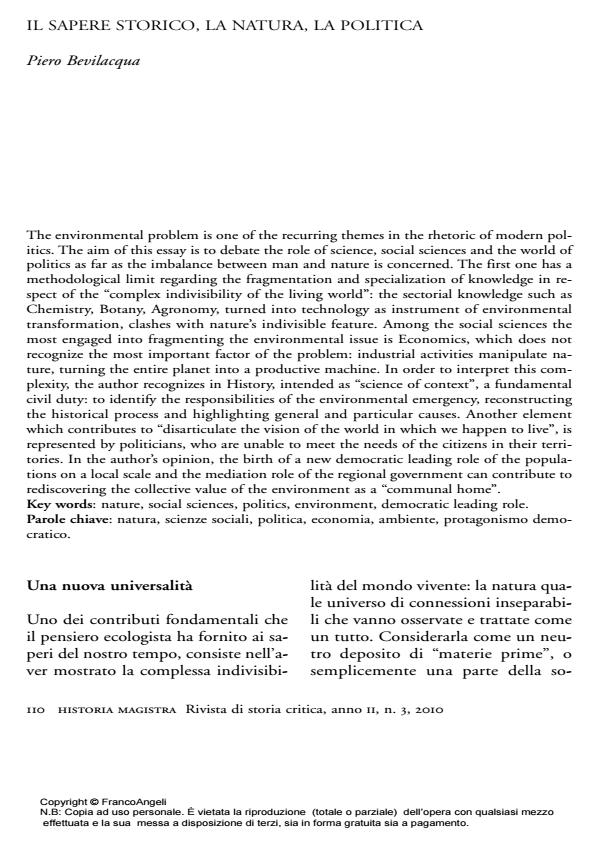Il sapere storico, la natura, la politica
Titolo Rivista HISTORIA MAGISTRA
Autori/Curatori Piero Bevilacqua
Anno di pubblicazione 2010 Fascicolo 2010/3
Lingua Italiano Numero pagine 9 P. 110-118 Dimensione file 307 KB
DOI 10.3280/HM2010-003009
Il DOI è il codice a barre della proprietà intellettuale: per saperne di più
clicca qui
Qui sotto puoi vedere in anteprima la prima pagina di questo articolo.
Se questo articolo ti interessa, lo puoi acquistare (e scaricare in formato pdf) seguendo le facili indicazioni per acquistare il download credit. Acquista Download Credits per scaricare questo Articolo in formato PDF

FrancoAngeli è membro della Publishers International Linking Association, Inc (PILA), associazione indipendente e non profit per facilitare (attraverso i servizi tecnologici implementati da CrossRef.org) l’accesso degli studiosi ai contenuti digitali nelle pubblicazioni professionali e scientifiche.
The environmental problem is one of the recurring themes in the rhetoric of modern politics. The aim of this essay is to debate the role of science, social sciences and the world of politics as far as the imbalance between man and nature is concerned. The first one has a methodological limit regarding the fragmentation and specialization of knowledge in respect of the "complex indivisibility of the living world": the sectorial knowledge such as Chemistry, Botany, Agronomy, turned into technology as instrument of environmental transformation, clashes with nature’s indivisible feature. Among the social sciences the most engaged into fragmenting the environmental issue is Economics, which does not recognize the most important factor of the problem: industrial activities manipulate nature, turning the entire planet into a productive machine. In order to interpret this complexity, the author recognizes in History, intended as "science of context", a fundamental civil duty: to identify the responsibilities of the environmental emergency, reconstructing the historical process and highlighting general and particular causes. Another element which contributes to "disarticulate the vision of the world in which we happen to live", is represented by politicians, who are unable to meet the needs of the citizens in their territories. In the author’s opinion, the birth of a new democratic leading role of the populations on a local scale and the mediation role of the regional government can contribute to rediscovering the collective value of the environment as a "communal home".
Parole chiave:Natura, scienze sociali, politica, economia, ambiente, protagonismo democratico.
Piero Bevilacqua, Il sapere storico, la natura, la politica in "HISTORIA MAGISTRA" 3/2010, pp 110-118, DOI: 10.3280/HM2010-003009